The ketogenic diet has become increasingly popular in recent years, offering a unique approach to nutrition that focuses on high fat, moderate protein, and very low carbohydrate intake. For those new to this way of eating, having a reliable guidebook can make all the difference in successfully adopting and maintaining a ketogenic lifestyle.
In this article, we’ll explore some of the available best keto books for beginners in 2025, providing you with valuable resources to kickstart your keto journey.
*As an Amazon Associate, I earn commission from qualifying purchases, but at no additional cost to you*
Why Keto Books Are Essential for Beginners
Starting a ketogenic diet involves more than simply cutting carbs. It requires a comprehensive understanding of how the body uses different macronutrients for energy and how to shift your metabolism into a state of ketosis.
A well-written keto book serves as a crucial tool for beginners by:
- Explaining the science behind ketosis in simple terms
- Guiding you through the initial transition period
- Providing meal plans and shopping lists
- Offering delicious and easy-to-make recipes
- Helping you troubleshoot common issues
With these benefits in mind, let’s dive into some of the top keto books that can set you up for success in [year].
Top Keto Books for Beginners
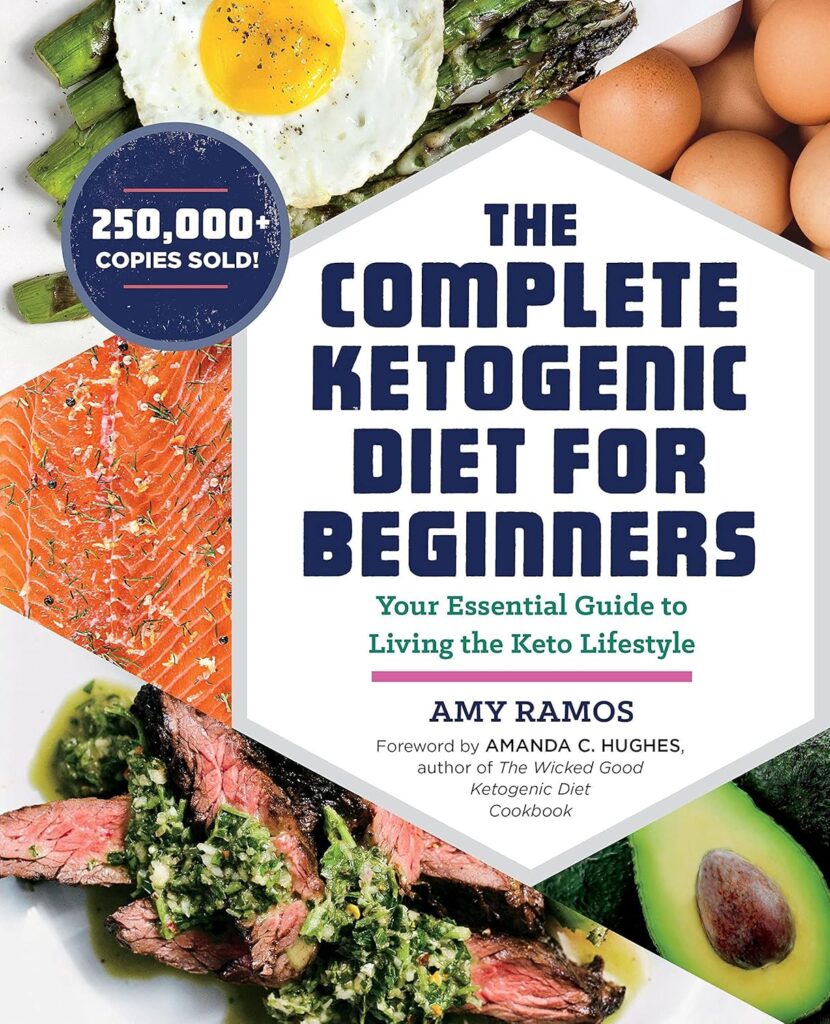
Amy Ramos’s book stands out as an excellent starting point for anyone new to the ketogenic diet. Ramos breaks down the fundamentals of keto eating in a clear, accessible manner that even finish novices can grasp.
The book includes a comprehensive 14-day meal plan, taking the guesswork out of your initial weeks on the diet.
One of the book’s strengths comes from its recipe selection. Ramos has curated a collection of simple yet flavorful dishes that don’t require advanced culinary skills.
This approach makes the ketogenic diet feel achievable for those who might be intimidated by complex cooking techniques.
The book also addresses common challenges beginners face, such as dealing with the “keto flu” and maintaining proper electrolyte balance. By anticipating these hurdles and providing practical solutions, Ramos helps readers navigate the early stages of keto with confidence.
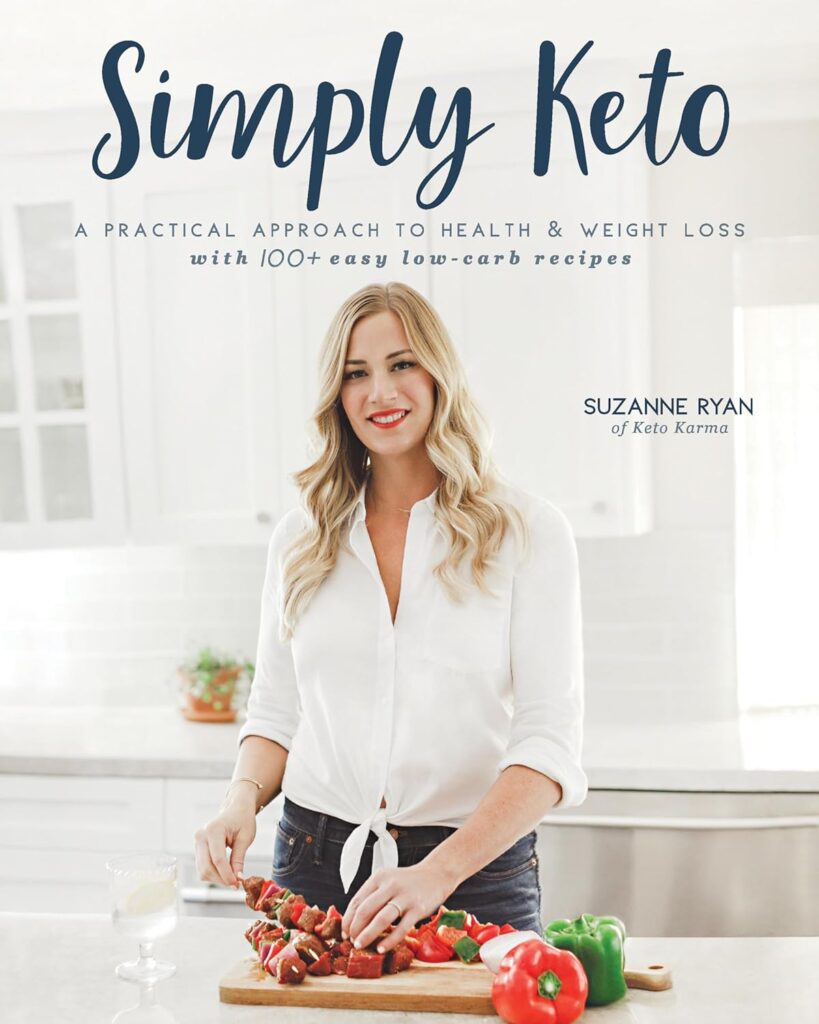
2. “Simply Keto” by Suzanne Ryan
Suzanne Ryan’s “Simply Keto” offers a unique perspective on the ketogenic diet, as it’s written from the standpoint of someone who has personally experienced significant fat loss success using this approach.
Ryan’s pathway of losing over 100 pounds on keto lends credibility to her advice and makes the book relatable for readers struggling with weight issues.
The book goes beyond just providing recipes and meal plans.
Ryan shares personal anecdotes, tips for staying motivated, and strategies for overcoming This combination of practical advice and emotional support makes “Simply Keto” feel like having a knowledgeable friend guiding you through the process.
Ryan’s recipes are designed to be satisfying and familiar, helping to ease the transition for those who might be worried about giving up their favorite foods. From keto-friendly versions of comfort food classics to innovative new dishes, the recipe section caters to a wide range of tastes and preferences.
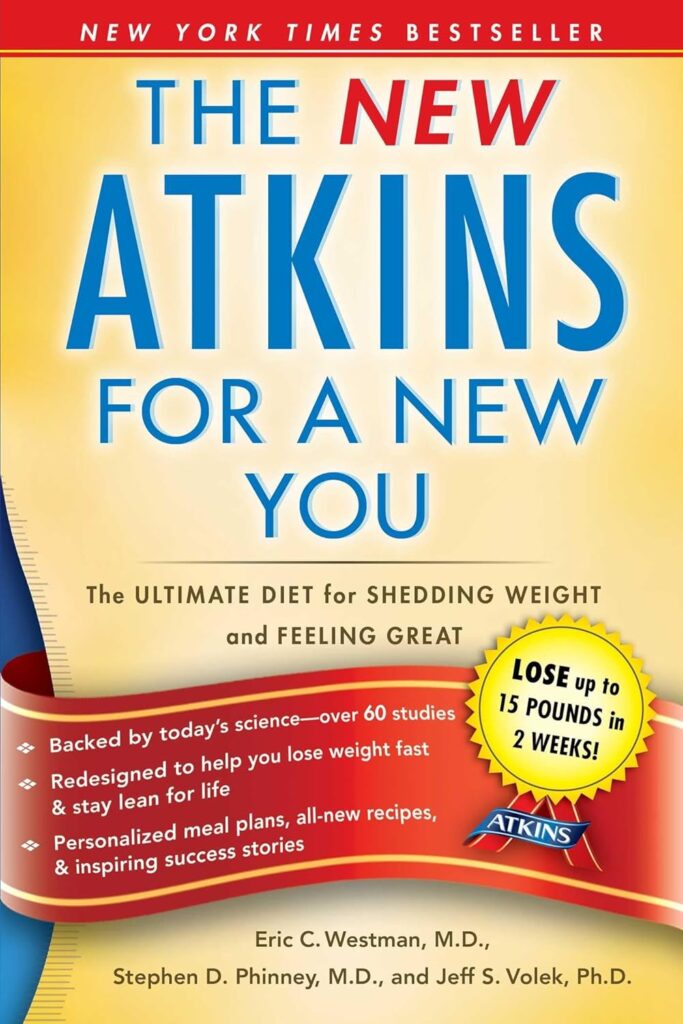
3. “The New Atkins for a New You” by Eric C.Westman, Stephen D.Phinney, and Jeff S. Volek
While not strictly a keto book, “The New Atkins for a New You” deserves a place on this list because of itsalignment with ketogenic principles and it’s scientific backing. Written by respected researchers in the field of low-carb nutrition, this book provides a solid foundation in the science behind carbohydrate restriction and its effects on metabolism.
The authors present a flexible approach to low carb eating that can be particularly appealing to beginners who find the idea of strict keto daunting.
The book outlines different phases of carbohydrate
restriction, allowing readers to gradually reduce their carb intake and ease into a ketogenic state.
One of the book’s strengths is its emphasis on individualization. The authors recognize that there’s no one-size-fits-all approach to nutrition and provide guidance on how to tailor the diet to your specific needs and goals.
This focus on personalization can be especially helpful for beginners who are still figuring out what works best for their bodies.
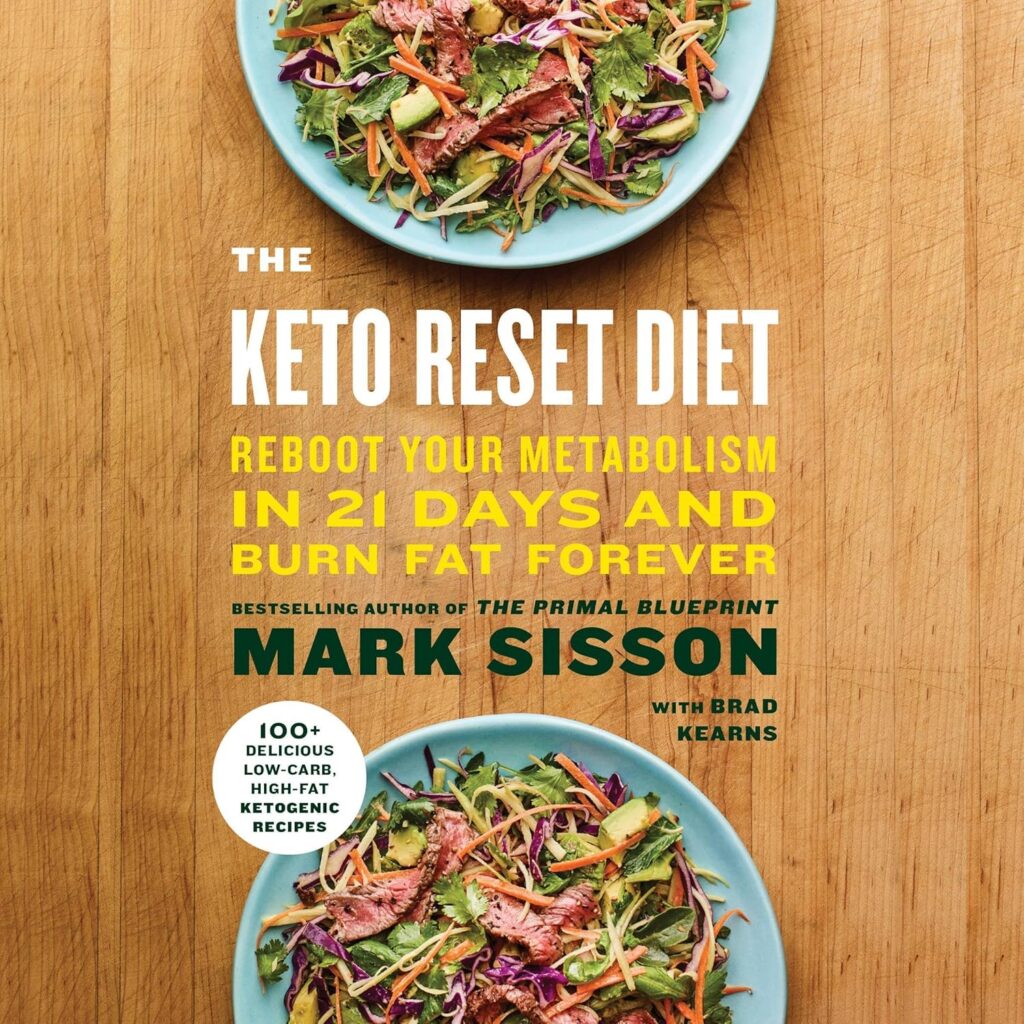
4. “The Keto Reset Diet: Reboot Your Metabolism in 21 Days and Burn Fat Forever” by Mark Sisson
Sisson’s approach involves a gradual transition into keto, which can be less intimidating for beginners. The book outlines a 21-day plan to reset your metabolism, helping your body become more effective at burning fat for fuel.
This preparatory phase can make the eventual shift to full ketosis smoother and more sustainable.
The book also takes a close look at the broader health benefits of a ketogenic diet beyond weight loss, discussing its potential impacts on inflammation, cognitive function, and overall well-being.
This comprehensive approach helps readers understand the full scope of what a ketogenic lifestyle can offer.
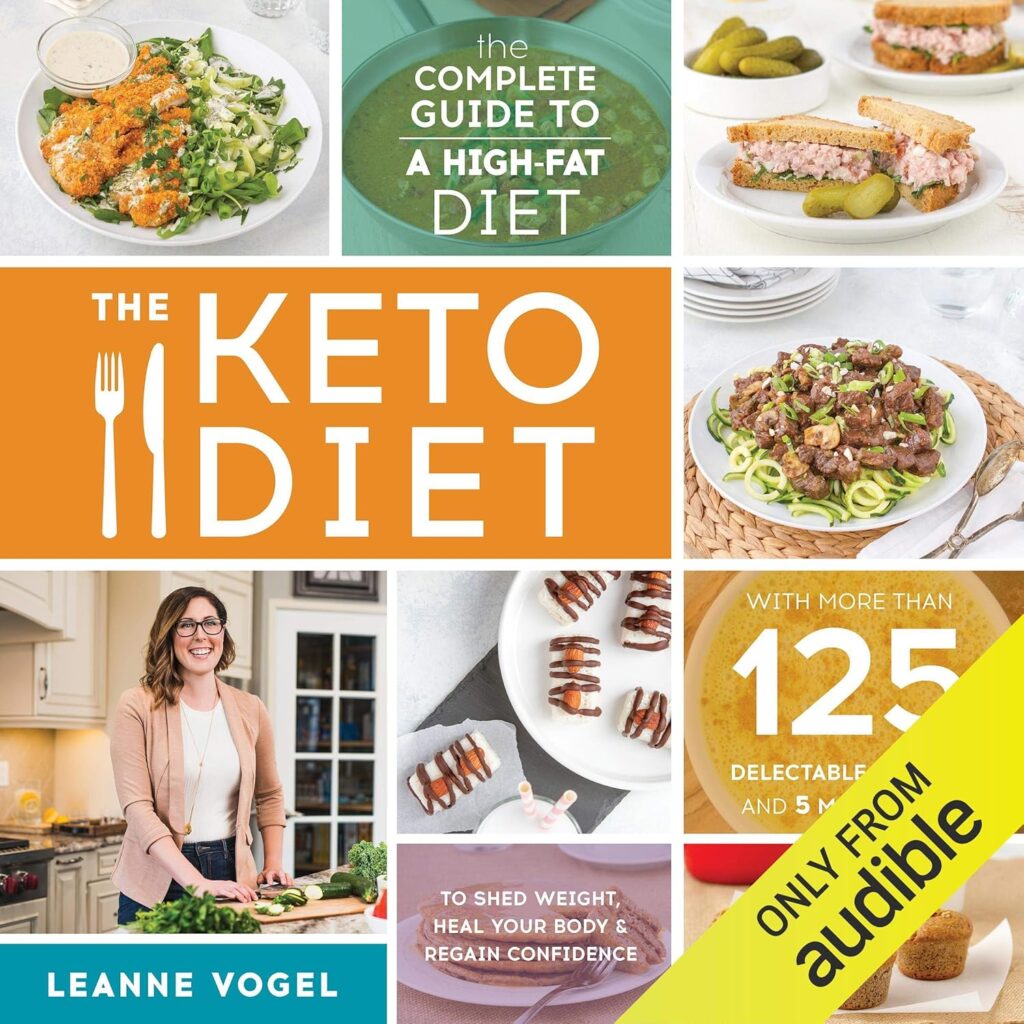
5. “The Keto Diet: The Complete Guide to a High-Fat Diet” by Leanne Vogel
Leanne Vogel’s “The Keto Diet” is a comprehensive resource that can grow with you as you progress in your keto journey. While it’s accessible to beginners, the depth of information provided makes it a valuable reference even for people who have more experience.
Vogel covers a wide range of topics, from the basics
of keto macronutrients to more advanced concepts like carb cycling and dealing with plateaus. The book includes over 125 recipes, catering to various dietary restrictions and preferences, including dairy-free and egg-free options.
One of the book’s standout features is its attention to the practical aspects of following a keto diet. Vogel provides guidance on meal planning, eating out, and navigating social situations while staying true to your keto goals.
These real-world tips can be invaluable for beginners trying to combine the diet into their daily lives.
Features to Look for in a Keto Book
When choosing a keto book, consider these key features:
Clear Explanations of Keto Principles
A good keto book should break down the science behind the diet in terms that are easy to understand. Look for books that explain concepts like ketosis, macronutrient ratios, and fat adaptation without resorting to overly technical language.
Practical Meal Plans and Shopping Lists
For beginners, having a structured meal plan can take a lot of the guesswork out of starting keto. Books that provide weekly or monthly meal plans, along with corresponding shopping lists, can be incredibly helpful in the early stages of the diet.
Variety of Recipes Suitable for Different Cooking Skills
The best keto books offer a range of recipes to suit different tastes and cooking abilities. Look for books that include both simple, quick meals for busy weeknights and more elaborate dishes for when you have time to experiment in the kitchen.
Troubleshooting Guides for Common Keto Challenges
Starting any new diet can come with obstacles, and keto is no exception. Books that address common issues like the keto flu, electrolyte imbalances, and fat loss plateaus can help you navigate these challenges successfully.
Success Stories or Case Studies for Motivation
Reading about others who have successfully adopted a ketogenic lifestyle can be incredibly motivating. Books that include personal stories or case studies can provide inspiration and practical tips from those who have been through the process.
Beyond the Basics: Advanced Keto Concepts
As you become more comfortable with the keto lifestyle, you might want to explore more advanced concepts. Look for books that talk about:
Cyclical or Targeted Keto Approaches
Some books explore variations of the standard ketogenic diet, such as cyclical keto (cycling in and out of ketosis) or targeted keto (consuming carbs around workouts). These approaches can be useful for athletes or those looking to improve their performance while still reaping the benefits of ketosis.
Combining Keto with Intermittent Fasting
Intermittent fasting is often paired with a ketogenic diet for enhanced results. Books that explore this combination can provide insights into how to safely and effectively apply both strategies.
Keto for Specific Health Conditions
While the ketogenic diet is often associated with weight loss, it’s also being studied for its potential benefits in managing various health conditions. Some books focus on using keto for specific purposes, such as managing diabetes, improving neurological health, or supporting cancer treatment.
Athletic Performance on a Keto Diet
For active people, books that address how to maintain or improve athletic performance while following a ketogenic diet can be invaluable. These resources often discuss topics like proper fuelling for workouts and optimizing recovery on a low-carb diet.
Long-term Keto Maintenance
Once you’ve reached your initial goals on keto, you might be wondering how to sustain the lifestyle long-term. Books that address keto maintenance can provide strategies for incorporating more flexibility while still enjoying the benefits of a low-carb, high-fat diet.
The Importance of Up-to-Date Information
The field of nutrition is constantly evolving, and new research on the ketogenic diet emerges regularly. When choosing a keto book, especially as a beginner, it’s crucial to choose one with the most current information.
Books published or updated in recent years are more likely to reflect the latest understanding of keto principles and practices.
Look for books that:
- Reference recent scientific studies
- Acknowledge evolving perspectives on fat and cholesterol
- Address newer concepts in the keto community, such as clean keto vs. dirty keto
- Discuss the latest findings on potential long-term effects of the diet
By choosing a book with up-to-date information, you’ll be better equipped to make informed decisions about your health and nutrition.
Personalizing Your Keto Approach
While keto books provide excellent guidance, the key to success on a ketogenic diet is finding what works best for you. Use these resources as a starting point, but don’t be afraid to adapt the advice to fit your lifestyle, preferences, and health goals.
Consider factors such as:
- Your current health status and any existing medical conditions
- Your activity level and fitness goals
- Your food preferences and any dietary restrictions
- Your schedule and lifestyle demands
Remember that the most effective diet is one that you can stick to long-term. Don’t be discouraged if you need to adjust the standard keto approach to make it sustainable for you.
Combining Book Knowledge with Digital Resources
While books provide a solid foundation, don’t forget to supplement your learning with digital resources. Many keto authors now offer companion websites, apps, or online communities that can provide extra support and up-to-date information.
These digital resources can offer:
- Recipe databases that are regularly updated
- Forums where you can connect with other keto dieters
- Tools for tracking macros and monitoring ketosis
- Video tutorials for cooking techniques or workout routines
By combining the in-depth knowledge from books with the dynamic nature of digital resources, you can create a comprehensive keto education that evolves with your needs.
Frequently Asked Questions
What is the ketogenic diet?
The ketogenic diet is a high-fat, moderate-protein, and very low-carbohydrate eating plan designed to shift your body’s primary fuel source from glucose to ketones, which are produced from fat.
How many carbs can I eat on keto?
Most ketogenic diets recommend limiting carbohydrate intake to 20-50 grams per day, though the exact amount can vary based on individual factors.
Is the keto diet safe for everyone?
While many people can safely follow a ketogenic diet, it’s not suitable for everyone. People with certain medical conditions, such as pancreatitis or liver failure, should avoid keto.
Always talk to a healthcare professional before starting any new diet.
How long does it take to enter ketosis?
Typically, it takes 2-4 days of very low carbohydrate intake (usually less than 50g per day) for most people to enter ketosis. However, this can vary based on individual factors such as metabolism and activity level.
Can I drink alcohol on the keto diet?
Some alcoholic beverages can be consumed in moderation on a keto diet, particularly those low in carbs like spirits. However, alcohol can slow fat burning and may impact ketosis, so it’s best to limit intake.
How do I know if I’m in ketosis?
Common signs of ketosis include decreased hunger, increased energy, and a fruity breath odor. However, the most accurate way to measure ketosis is through blood, breath, or urine testing.
Can vegetarians or vegans follow a keto diet?
Yes, it’s possible to follow a vegetarian or vegan keto diet, though it requires careful planning to confirm adequate protein intake and may involve the use of plant-based protein powders and supplements.
Will I lose muscle on a keto diet?
When done correctly with adequate protein intake and resistance training, a ketogenic diet should not cause significant muscle loss. In fact, some studies suggest it may help preserve muscle mass during fat loss.
Can the keto diet help with diabetes?
Some research suggests that a ketogenic diet may help improve blood sugar control in people with type 2 diabetes. However, diabetics should only undertake a keto diet under close medical supervision.
Is the keto flu inevitable when starting the diet?
While many people experience symptoms known as the “keto flu” when first starting the diet, it’s not inevitable. Proper hydration, electrolyte supplementation, and a gradual reduction in carbs can help minimize these symptoms.
Key Takeaways
- Choosing the right keto book can significantly impact your success on the diet.
- Look for books that offer clear explanations, practical meal plans, and troubleshooting guides.
- Consider books that align with your specific goals and lifestyle.
- Supplement book knowledge with digital resources for a comprehensive approach.
- Remember to personalize the keto approach to fit your individual needs and preferences.
